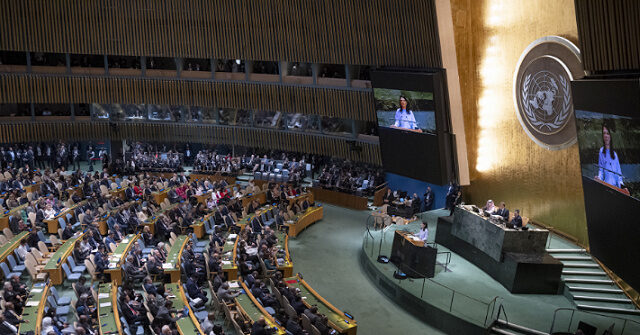The 2025 U.N. General Assembly (UNGA) will likely be dominated by the drama over European states unilaterally declaring Palestinian independence, but it will also be an important week for the BRICS economic collective, which has positioned itself as an alternative to the post-World War II international order led by the United States and Europe.
BRICS is named after its first five members: Brazil, Russia, India, China, and South Africa, which joined after the group’s founding in 2009.
The name BRIC was coined in 2001 by a Goldman Sachs economist who saw the four original members coalescing into a mega-economy that could challenge the power of the Western world. Russian President Vladimir Putin thought that sounded like a great idea and hosted the first official summit in 2009. China invited South Africa to join the following year.
Five new members were added in 2023, including Egypt, Iran, the United Arab Emirates (UAE), and Ethiopia. In October 2024, 13 more “partner countries” were added, gaining what amounted to observer status at BRICS meetings. Partner nation Indonesia graduated to full membership in January 2025.
Argentina and Saudi Arabia were also invited to join BRICS in 2023. Argentina, under pro-U.S. libertarian President Javier Milei, declined the invitation, while Saudi Arabia is keeping its options open.
The current roster of BRICS is a somewhat uneasy mixture of bad actors like Russia and China, which hope to build the bloc into an effective counter to the U.S.-led Group of Seven (G7) nations, and countries like India and the UAE, which are not quite so eager to climb aboard an explicitly anti-Western alliance dominated by Beijing. Brazil holds the rotating presidency of BRICS this year, but no serious observer doubts that China is the permanently commanding member.
BRICS has definitely grown in influence, with its membership now encompassing something like a quarter of the planet’s Gross Domestic Product (GDP) and half its population, but its membership remains sharply divided on both political and economic issues. One of the few things they have in common is a feeling that the international system has been dominated by the U.S. and Europe for too long.
As the Council on Foreign Relations (CFR) pointed out in a June 2025 analysis, the most important thing BRICS actually does at the moment is manipulate institutions like the United Nations. BRICS desperately needs a strong, active, and well-funded U.N. to keep itself relevant.
There has been some meaningful economic coordination between the members, and some of them dream of creating an alternative financial system that would dethrone the U.S. dollar, but the BRICS development funds are a fraction of the size of the World Bank and International Monetary Fund (IMF).
The Russian invasion of Ukraine in 2022 caused a good deal of tension between the members, especially since many of them believe the highest aspiration of BRICS is to prevent smaller nations from getting steamrolled by superpowers. Supporting, or tacitly accepting, Putin’s war of conquest made it harder for the other members to claim they desire respect for smaller nations above all other goals.
Within the BRICS coalition, India would very much like to be the leader of the “Global South” constellation of developing nations, rather than China (for either of those titanic, resource-hungry economies to claim they are “developing nations” is increasingly laughable).
Some of the older members fear the 2023-2025 membership drive would dilute their own influence. A few of them have been reluctant to burn bridges with the United States by pledging themselves to a hostile China-dominated alliance whose stated goals include blowing up the American currency.
With that in mind, the UNGA is perhaps the most important platform for BRICS. The U.N. hierarchy has been quicker to recognize BRICS as a major force in global politics than the U.S., NATO, or the G7. Secretary-General Antonio Guterres has become a regular speaker at BRICS summits, where he often salutes the bloc as more amenable to globalist goals than the Western world, especially since President Donald Trump returned to office.
President Trump’s tariff diplomacy has given the BRICS nations some reasons to cleave together, but has also prompted some anxiety because the bloc cannot collectively replace the income its members gain by trading with the United States. Trump is also cutting back on American funding for international programs that the BRICS members rely upon. His whole approach has been calling globalism’s bluff as an illusion disproportionately financed by the American taxpayer.
This is not really a conversation most of the BRICS members want to have right now, years before they might be truly ready to compete with the Western economy. There is also little opportunity for this year’s UNGA to give the BRICS nations a chance to take center stage on major international affairs. They are largely tangential to the Palestinian-Israeli drama and, as mentioned, Russia’s war in Ukraine is an uncomfortable subject for them, given that one of the founding BRICS members is the perpetrator.
The best outcome BRICS might expect from UNGA would be a strengthening of the international institutions in which they would like to hold more important roles, such as the United Nations itself. The problem is that Trump seems unlikely to reopen America’s wallet, and no one else can match the funding America provided.
India is working on delicate trade negotiations with the United States at the moment, including meetings on the sidelines of UNGA, so it will probably want to avoid antagonizing the United States with theatrics at the General Assembly. Brazil and South Africa have strained relations with America at the moment, while Russia and China are outright adversaries.
The more trouble the BRICS nations cause at the UNGA, the more they might weaken America’s interest in the United Nations itself, and the Palestinian drama is likely to test Trump’s patience. If the senior and junior members of BRICS are smart, they will spend much of the coming week talking about how much they love and respect the United Nations.

















